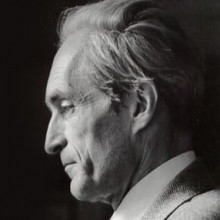This is an extract from a 1971 interview, in which Frans Brüggen was asked to explain the “phenomenon Leonhardt”. At that stage, they had already been friends for more than 10 years and had become internationally famous through their records and for giving concerts together.
Leonhardt is Bach
For me, Leonhardt is the personification of Bach. I imagine that Leonhardt is just like Bach must have been: strict, fair-minded, mild, with a good sense of humor, someone who was occasionally rebellious and, at the same time, very disciplined. Bach must also have had a remarkable memory and, like Leonhardt, he was absolutely congruent in everything that he did.
Asceticism
Take his house, for example [the Bartolotti House, built in 1617]. That house fascinates him immensely, and he simply has to know everything about it. He has spent a huge amount of time at the Municipal Archive, looking through old inventories and documents, which he copies out himself. He refuses to make photocopies. No, it must be done by hand. He has a sort of monk’s mentality! [In 1979, Leonhardt wrote a meticulously researched book about his house, called Het huis Bartolotti en zijn bewoners.]
Very much against his will, he allowed the Hendrick de Keyser Foundation [owners of the Bartolotti House] to install central heating. Leonhardt really doesn’t believe in such things and, because of this, he keeps switching everything off. Central heating is nonsense … and (according to him) it spoils your brains! If you go there for a rehearsal in the winter, then you’ll often see Leonhardt sitting in front of the harpsichord, wearing a scarf and his winter coat, because of the cold. Everyone else just has to accept it. It is a bit annoying, but that’s just the way that it is.
Authoritarian?
Absolutely not. But he may perhaps come over that way, to people who don’t know him well. But he’ll never attempt to impose his views. He will simply say what he thinks, and leave it to the other person to decide. But you know that he is always right.
What I really admire in him, is the congruent way in which he lives his life. He will never do anything that he has not completely mastered, he will never lie, and he always becomes very involved in whatever he takes on.
Improvisational ability
As a continuo player, he has no equal, in terms of inventiveness. He is someone who will never make a mistake. But technique is not really important to him, it’s nothing more than a means to an end.
He believes that you should be “reasonably handy” on your own instrument … One of his greatest strengths is his ability to improvise, particularly when playing continuo. And his sense of rhythm, that flawless subtle rubato, is what gives his playing such a strong forward impulse!
I am constantly learning from him, and his absolute certainty that he is always right [in musical matters], is such a great inspiration.
He has a memory like an elephant, and can memorize music very easily. But he will never play a piece by heart, as he thinks it’s unnecessary.
He can [also] tell you about practically every house in Amsterdam that has been restored, what was involved, and what was not done well. [In 1996, Leonhardt wrote a book about this, called Amsterdams Onvoltooid Verleden]
Perfectionist
Leonhardt is a perfectionist. His attitude is that if you’re concerned with the past, you should also try to be the past.
Music is only part of his life, it is certainly one of the things that he values, but it is not the most important. But, for him, it is imperative that a house is properly restored, an historic organ is saved from destruction, or that something old has been appropriately preserved. Actually, these things are much more important to him, than that he plays a piece of Bach.
He delights in beauty, not the sort that’s preserved and stored in museums, but something that is alive and flourishing – just like his own playing. He definitely couldn’t live without beauty, and if it doesn’t exist, then he will he create it himself!
A man of his times? No, not really. Rather, he is timeless. He is one of the last patricians. And to me, he is the personification of Bach. Leonhardt is Bach.
© Frans Brüggen 2012
Translation © www.semibrevity.com 2012
Thanks are due to Frans Brüggen, who kindly gave his permission for me to translate and publish this interview.
In terms of Leonhardt being Bach, see this mini-documentary, made in 1967, about the filming of Chronik der Anna Magdalena Bach. It includes a short interview with Leonhardt, in which he talks about how it felt to play the part of Johann Sebastian Bach.
The full film, without subtitles, has been uploaded here.
Purely by chance, I came across this video in which the producer of Chronik der Anna Magdalena Bach, Gian Vittorio Baldi, tells the funny story, recorded at a film festival in 2006, of how he managed to raise the money for the film.
More memories of Leonhardt
In contrast to the many Leonhardt obituaries which focus of his influence, Professor Davitt Moroney, who studied with Leonhardt more than 30 years ago (and, incidentally, was also a student of Thurston Dart), has just published a fascinating and very extensive piece (downloadable here as a pdf) which “is intended as a tribute to his complexity and to the difficulty of identifying what made Leonhardt Leonhardt”.
To end with, here’s a rare TV recording, from 1964, of Brüggen with Leonhardt playing a modern-style instrument, probably an Ammer.


Leave a Reply